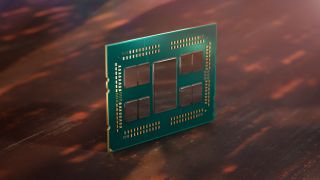Ryzen Threadripper 7000 Storm Peak CPU Surfaces With 64 Zen 4 Cores
AMD's Ryzen Threadripper 7000-series CPUs are already in the wild.

As AMD is rolling out the Ryzen 7000 'Raphael' processors with up to 16 cores based on the Zen 4 microarchitecture, the company itself is already testing its next-generation Ryzen Threadripper 7000-series 'Storm Peak' CPUs with increased core count and other perks that high-end desktops and workstations tend to offer.
AMD (and some of its close partners) tend to test the company's EPYC and Ryzen Threadripper processors on distributed computing workloads since they take advantage of high core counts. However, this time, someone tested an engineering sample of AMD's yet-to-be-announced CPU with 64 cores with simultaneous multithreading support in Einsten@Home, as uncovered by Benchleaks.
The CPU carries the "AuthenticAMD AMD Eng Sample: 100-000000454-20_Y [Family 25 Model 24 Stepping 1]" identifier, which does not correspond to any known AMD processor. Meanwhile, since there are not so many new 64-core CPUs from AMD, it is safe to assume that we are dealing with the codenamed Storm Peak processor.
AMD's Ryzen Threadripper 5000WX-series processors for workstations (which are the best CPUs for workstations these days) came to market a lot later than expected, perhaps because the company repositioned these CPUs from enthusiast-grade extreme desktops to a more lucrative workstation market, or maybe because its arch-rival Intel did not have any decent rival for AMD's Ryzen Threadripper 3000- and 3000WX-series CPUs.
Yet it looks like with Zen 4-based Ryzen Threadripper 7000-series processors AMD will be somewhat faster. According to AMD's roadmap, the company plans to launch these CPUs in the first half of 2023.
In addition to next-generation Ryzen Threadripper, someone is testing AMD's next-generation APU codenamed Phoenix Point APU accelerated processing units for mainstream laptops and desktops in Rosetta@Home.
Unfortunately, neither Einstein@Home nor Rosetta@Home reveals decent performance numbers for CPUs, so we can only guess how fast AMD's upcoming processors are. Meanwhile, it is essential that they already exist in silicon and are being tested outside of the lab.
Stay on the Cutting Edge
Join the experts who read Tom's Hardware for the inside track on enthusiast PC tech news — and have for over 25 years. We'll send breaking news and in-depth reviews of CPUs, GPUs, AI, maker hardware and more straight to your inbox.

Anton Shilov is a Freelance News Writer at Tom’s Hardware US. Over the past couple of decades, he has covered everything from CPUs and GPUs to supercomputers and from modern process technologies and latest fab tools to high-tech industry trends.
-
Foeke If you take the performance of the R7950 @65W and multiply that with 4, You'll have some guesstimation on what the performance will be at 275W or so (I/O die takes quite some juice)Reply -
escksu ReplyAgentBirdnest said:The first kilowatt CPU? :p
IF overclocked... If not, I think aorund 500W. -
-Fran- Reply
That would be an IBM Power for Mainframe. Those run stock at ~600W.AgentBirdnest said:The first kilowatt CPU? :p
https://en.wikipedia.org/wiki/Power10https://www.anandtech.com/show/15985/hot-chips-2020-live-blog-ibms-power10-processor-on-samsung-7nm-1000am-pt
They're massive honking CPUs as well.
Regards. -
escksu ReplyFoeke said:If you take the performance of the R7950 @65W and multiply that with 4, You'll have some guesstimation on what the performance will be at 275W or so (I/O die takes quite some juice)
7950 is 170w default, not 65w. -
escksu Replyspentshells said:I would like to see this benchmarked at the wattage used by the 5990
Still faster. Because tis on 5nm -
deksman Replyescksu said:7950 is 170w default, not 65w.
7950 can be run in two eco modes. One is 65W, and the other is at 105W.
105W is arguably a much better mode because it almost halves power consumption (reduces temps by about 20 degrees C as well), but impacts multicore performance by about 5-10% - this I think would be a more accurate measurement.
I would like to see this benchmarked at the wattage used by the 5990
I would imagine that the TR series will be about 30-35% faster at same wattage compared to their current counterparts - if AMD further tunes the TR series voltages and power consumption, they might get a bit more performance at stock.
In testing the 7950x, reviewers discovered that running it in ECO mode of 105W (same as 5950x), the 7950x was 34% faster.
I would imagine that there would be no point for AMD to clock TR's to a much higher degree like they have done with consumer parts. Part of the reasoning for that would be because when talking about TR's and data centre solutions, performance per watt and overall power consumption matter more than pure performance... also, Intel has no real response to AMD's TR or data centres, so I think it would be better for AMD to stick to pre-existing power consumption figures like on Zen 3 TR's and data centres, and just get 35% more performance (which is a decent increase anywa and consistent with previous releases).
Most Popular




